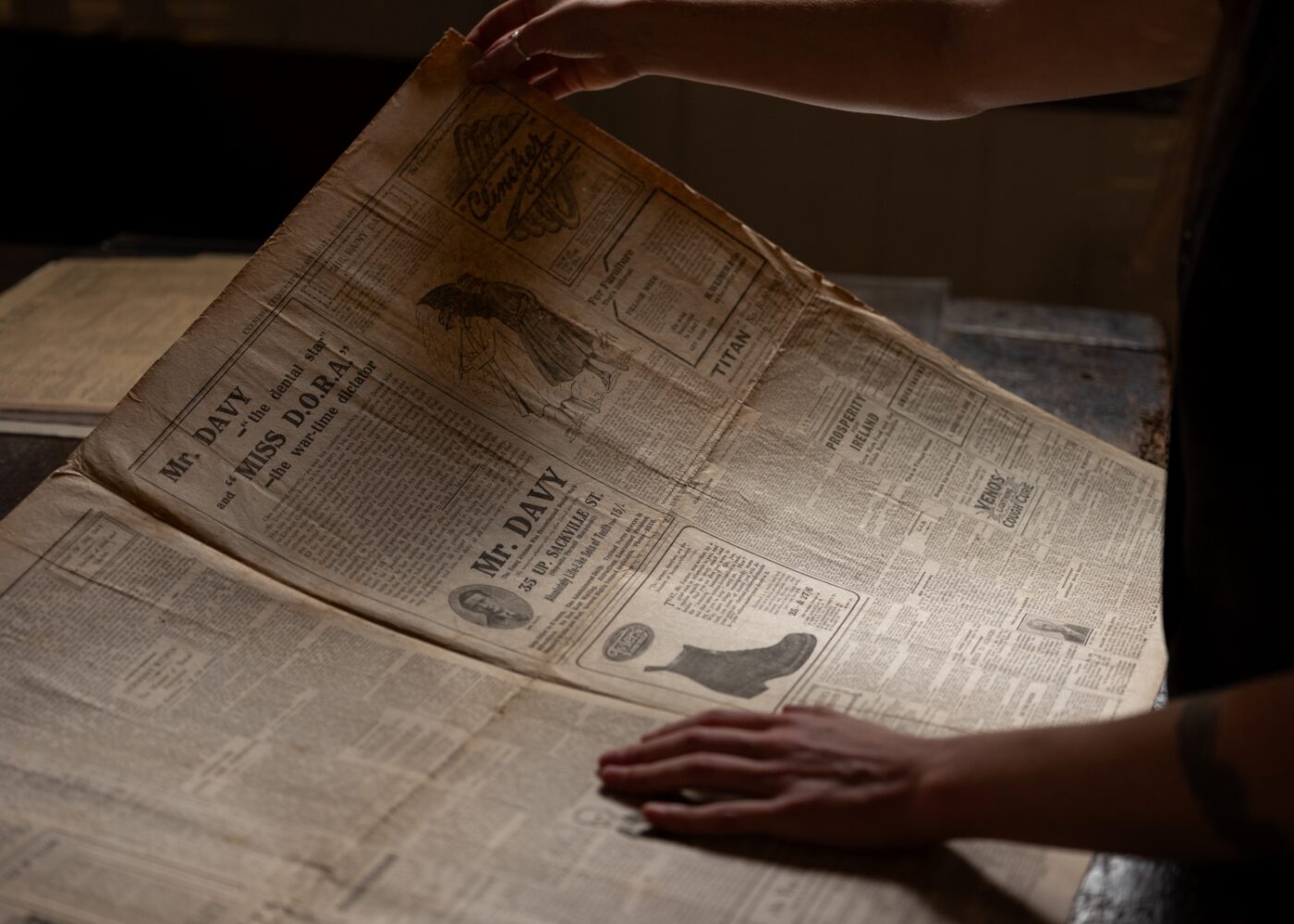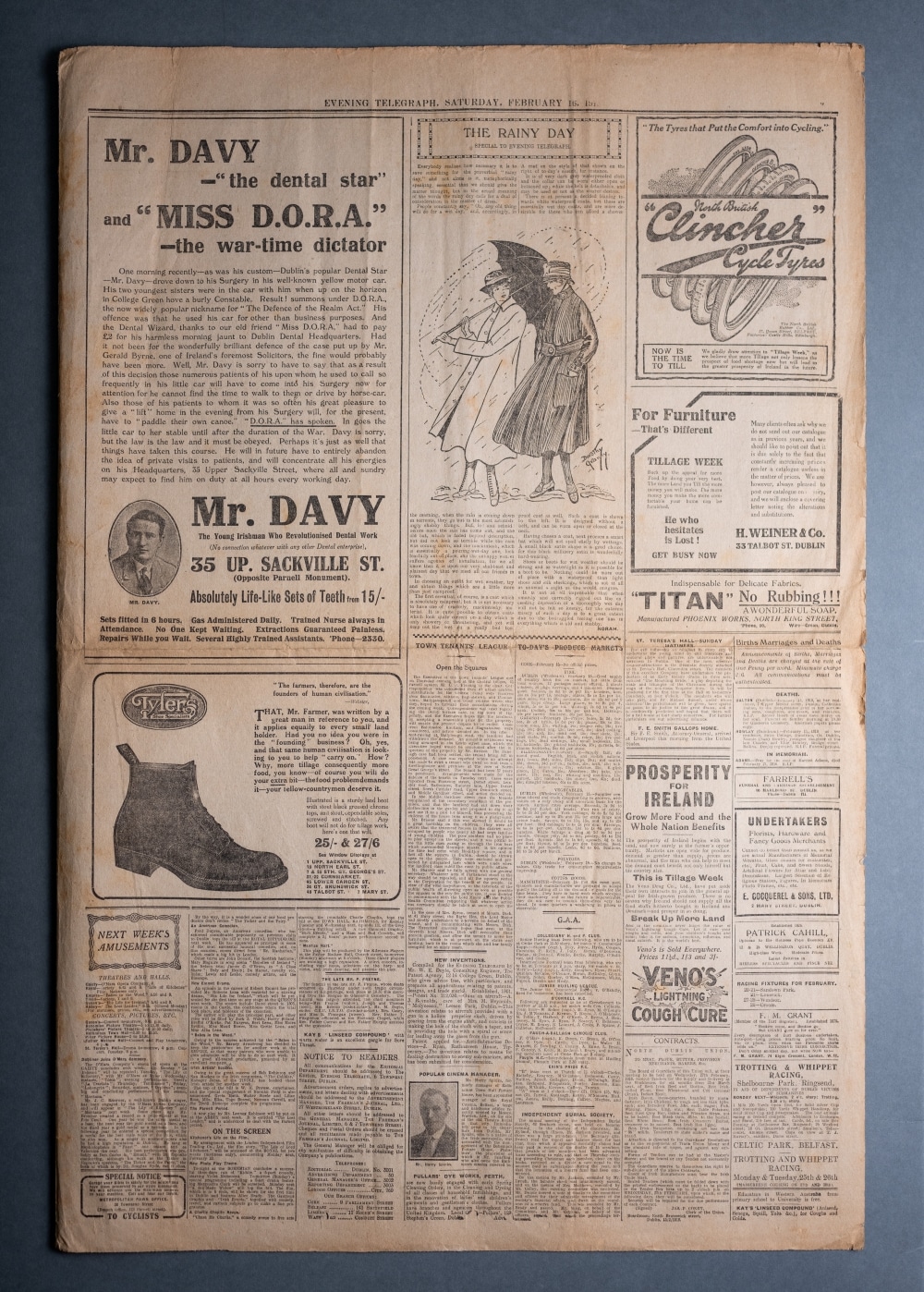Mr Davy and Ms DORA – 1918 Evening Telegraph



This advertisement was one which initially caught my attention because of the unique way in which it advertises a dentistry practice. However, as I researched more, I found a story with many twists and turns I was not expecting. The title of the ad was what piqued my interested in the first place:
Mr. Davy – ‘The dental star’
And
‘miss D.O.R.A’ – The war-time dictator
The ad details Mr. Davy – the dental star – being fined for the use of his car to go for a “jaunt” with his sisters in town. The reasoning was that this was non-business related use of his car which was forbidden under D.O.R.A, the Defence of the Realm Act, at the time. The story goes on to say that he can no longer do house visits for his clients or give his clients rides home. At the end it advertises his cheap full sets of teeth.
But what was the Defence of the Realm Act? This act was passed in 1914 at the beginning of the first World War and allowed the British executive branch of government the power to enact new laws without parliament. Through it, the British government created new laws and regulations which were meant to keep the population safe and morale high during the war. However, in practice D.O.R.A was often used to censor the press and suspend the right of trial for citizens. In Ireland, the act became a way for the British Government to suppress Irish Republicanism after the 1916 Easter Rising, being used until 1920 to arrest and charge Irish civilians in a military court without the need for any trial. During this time, thousands of Irish people were arrested using D.O.R.A and detained without trial for months or years. In 1920, the Defense of the Realm Act was replaced with the Restoration of Order in Ireland Act, which continued the practical suspension of habeas corpus. Though this ad for Mr. Davy’s dentistry doesn’t explicitly note the repression which D.O.R.A was used for, it does poke fun at the absurdity of restricting automobile usage and illustrates the public’s general dislike of “Miss D.O.R.A the war-time dictator”.
Outside of this background, Mr. Davy is himself an interesting character. Advertisements for his dental practice pop up throughout the mid to late 1910s, with a 1915 ad stating that he had just moved back to Dublin from London and brought his new revolutionary dental practices with him. However, in 1916 a court case was brought against Mr. Davy, whose real name was David Isaacson, which essentially accused him of false advertising. Isaacson was not registered to practice dentistry under the Dental Act of 1878 and, although the practice of dental work without a license was not illegal at the time, a person who was practicing dentistry without a license could not call themselves dentist. This led to the court case about false advertising, as one of his 1916 ads referred to him a “dentist”. Isaacson argued that it was his assistant who placed the advertisement and, since it was the only advertisement which explicitly called him a dentist, it was an accidental use of the word and he should not be fined. The judge ruled in his favor on this count but did fine him 40 pounds for using the letters “D.D.S. USA” on his business card – this was a US license for dentistry that was not recognized by the British Government. The judge ruled that the business card implied Isaacson had a dentistry license, when in fact he didn’t.
Mr. Davy’s practice continued to be advertised through to 1922, after which it quietly disappeared from the Irish Newspaper Archives. The only other mention of Isaacson’s lawsuit was in 1918, when an article in the Irish Independent detailed how one Bertram D. Black had to defend himself against a complaint from the British Dental Association because of his affiliation with Isaacon’s dental practice. Black claimed that while he had previously worked for Isaacson, he had since severed all ties and regretted his association with him. The Dental Committee called Black “foolish” but forgave him his former association. This shows that while Mr. Davy may have been spending quite a lot on advertising, he had a less than desirable reputation with professional dentists at the time. All this considered, it does make his claims for cheap, painless, complete sets of new teeth a bit dubious.
By Mazie Smallidge, researched and written for #OpentheArchive, June 2025.
